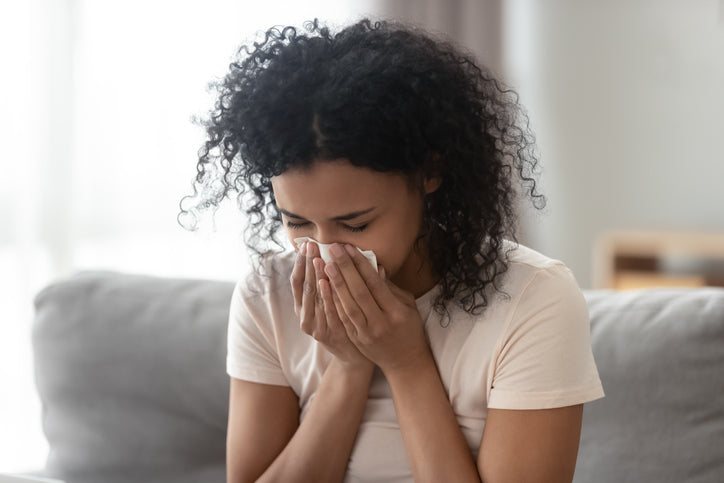Allergies. If you have ‘em, you hate ‘em. From a deadly peanut allergy to spring hayfever, there’s pretty much no argument over just how vexing allergies can be. They might send your sinuses into overdrive, give you a crazy rash, or even make it hard to breathe. But can allergies make you tired?
Yep! Unfortunately, they do that too. No matter what type of allergies you might suffer from, when they’re doing their thing, they can definitely make you feel more than a little sleepy. So what’s the connection?
How Do Allergies Make You Feel Sleepy?
You don’t really need somebody else to tell you that allergies can make you tired. But what’s the science behind the whole thing? Well, the answer is simpler than you may think.
Many people experience coughing, sneezing, congestion, and a runny nose when their allergies are acting up, which makes it harder to sleep at night. They toss and turn all night, then wake up feeling like they hardly got a wink of sleep. (Because they probably didn’t get much.)
Which Allergens Can Make You Tired?
If allergy symptoms make it harder to sleep, then eliminating those allergens is one of the best ways to ensure you can snooze peacefully. Stay on high-alert for these four common allergens.
1. Mold
Mold doesn’t just cause allergies—it can cause other long-lasting health problems, too. Minimize mold by keeping your sleep environment dry and ventilated. Yep, that means no more hanging your wet towel over the bed frame! Avoid putting even semi-damp sheets on the bed, and always use the exhaust fan in the bathroom when you shower.
2. Dust Mites
No matter how often you clean your house, a little dust is likely to settle here and there. And where there’s dust, dust mites follow. These microscopic critters feed off dead skin cells you shed when you sleep, meaning they love hanging out on pillows and sheets. Before you’re completely traumatized, just know that you can stop them in their tracks by adding a dust mite cover to your mattress and pillows.
3. Pollen
Listen up if you’ve got seasonal allergies! Pollen reaches its peak in the spring and fall, and while there’s not much you can do to stop Mother Nature, you can combat allergy symptoms by taking over-the-counter medication. Just remember that medicines containing pseudoephedrine could keep you up at night, while allergy meds that contain antihistamines could make you drowsy—which doesn’t really help with the matter at hand, does it?
4. Pet Dander
Humans are constantly shedding tiny flakes of skin, and our pets are no different. Known as pet dander, these microscopic flakes are a common allergen that can send you into a sneezing frenzy. Minimize the damage by bathing and brushing pets regularly, and keeping them off the furniture. As cuddly as they may be, it’ll help you get more restful sleep.
How To Treat Allergies
You’ve done your due diligence and reduced the allergens in your home. Sadly, you might still be dealing with allergy symptoms. Prescription allergy medicine or an allergy shot may help—but when your allergies are really bringing you down, it’s time to bring in the big guns.
Yeah, that means avoiding whatever is causing the allergies in the first place. If you’re allergic to pollen, limit your time outdoors during the peak season. If you’re allergic to your BFF’s cat, it might be time to hang out exclusively at your pad. And if your bedding is full of dust mites? Invest in a hypoallergenic, antimicrobial eucalyptus comforter, which naturally minimizes dust mites and mold so you can sleep easy.
